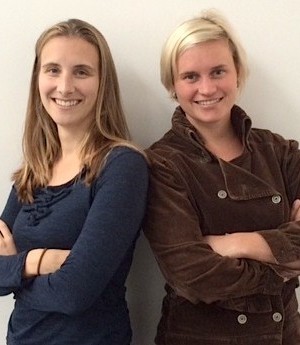Local real estate start-up OpenAgent has closed a $1 million funding round with prominent investors including Pete Flint, the co-founder of US online real estate behemoth Trulia.
Founded in 2012, this is big news for the agent review platform. This latest contribution brings the total funding to $1.4 million, after co-founders Marta Higuera and Zoe Pointon (pictured right), last year reeled in an initial round of $400,000.
Other notable investors who have joined Flint in investing in OpenAgent include co-founder of One Big Switch, Paul Hunyor, and Ellerston Capital Advisory Board member Anthony Klok, whose previous investments include Temando and Deals Direct.
OpenAgent helps Australian home owners sell their property, by providing rankings of all real estate agents based on past sales and customer reviews and connecting them with the best agent in their area and for their property.
Excited about the vote of confidence from the big investors
OpenAgent co-founder Zoe Pointon said securing the confidence of such high profile investors was almost as exciting as securing the actual funds.
“Having Pete Flint come on board as an investor and advisor is just huge,” she remarked.
“Pete knows this space better than just about anyone, having built Trulia – one of the world’s biggest online real estate businesses – from the ground up.”
“Pete loves what we’re doing, and clearly thinks OpenAgent has a bright future. You can’t get a better vote of confidence than that.”
“After closing the initial round last year, we put all our energy into proving the model. We are now focused on scaling the business up,” Pointon revealed.
How did OpenAgent come to life?
“The idea for OpenAgent was motivated by my own experiences dealing with real estate agents of such varied quality. After a few conversations with friends and colleagues, it became clear that I wasn’t the only one,” Pointon shared with Anthill.
“Some agents had poor communication, didn’t turn up on time to open homes and were negotiating against their vendors,” she added, “On the other hand; some agents were extremely professional and committed to providing the best service possible.”
“The problem was not being able to tell the difference before deciding to work with them.”
Pointon further pointed out that given the fact that the sale of a property is the largest transaction most people will ever make, it seemed like there should be a way for people to find out quality performance information about the agent they were hiring and that all this information should be available in one place.
“We both have a strategy consulting background so we worked part time to fund the business in its initial stages – we were working from my kitchen table,” she further revealed, “Once we were confident that we had a profitable model, we held a seed funding round and raised AU$400,000.”
What strategy has OpenAgent used to reach this point of working with a notable real estate giant of Pete Flint’s calibre?
“The biggest thing we’ve done is been ruthless in testing before we build,” Pointon told Anthill, “Early on we had a lot of ideas about how OpenAgent could or should work, but we had to figure out which assumptions were right and which were wrong.”
“We had to test to see if people were more interested in finding the cheapest agent or the best agent to sell their house, we had to test whether people prefer us to call them and talk them through the options available, we had to test how to engage with the best agents and get the best results working with them,” she explained.
Pointon further highlighted that as they were initially small and unfunded, they had to find super-MVP ways of testing these assumptions, to quickly and cheaply get to a business model that works.
“This helped us to get traction quickly, and that of course helps you get a meeting. But by going through this process we were able to talk to the smartest people in the industry and answer their questions confidently and with real facts rather than just ideas.”






![Do you have happy staff? 5 ways to improve performance [FREE DOWNLOAD]](https://anthillonline.com/wp-content/uploads/2016/06/chris-smith-cheatsheet-04c.pdf-Box-2016-06-30-20-45-20-300x194.png)
![How to give good headlines, and create emails that get opened [CHEAT SHEET]](https://anthillonline.com/wp-content/uploads/2013/11/7-steps-cheatsheet-3d-cover-nuova--100x75.png)
![Generating Web Traffic with Mark Middo and James Tuckerman [FREE REPORT]](https://anthillonline.com/wp-content/uploads/2015/08/Capture3-100x75.jpg)
![The Ultimate Social Media Almanac with James Tuckerman [Cheat Sheet]](https://anthillonline.com/wp-content/uploads/2015/11/Screen-Shot-2015-11-26-at-11.24.55-100x75.png)
![How To Grow Your Business and Profits with Jason Cunningham [CHEAT SHEET]](https://anthillonline.com/wp-content/uploads/2015/07/Cunningham-100x75.png)
![Learn how to use Instagram as a business tool [FREE INFOGRAPHIC]](https://anthillonline.com/wp-content/uploads/2012/12/nickelbackinstagram-100x75.jpg)

![The reinvention of something is often even more awesome than the original creation [VIDEO]](https://anthillonline.com/wp-content/uploads/2013/04/RedNoseDay.png)
![How to expand into New Markets with Elsita Meyer-Brandt [CHEAT SHEET]](https://anthillonline.com/wp-content/uploads/2015/07/Screen-Shot-2015-11-26-at-15.52.30-300x194.png)
![Learn how to generate more leads in one month than most competitors would in one year! [FREE REPORT]](https://anthillonline.com/wp-content/uploads/2015/08/Capture4-100x75.jpg)
![How to price your product or service in 8 steps with Steve Major [FREE INFOGRAPHIC]](https://anthillonline.com/wp-content/uploads/2015/07/Screen-Shot-2015-11-26-at-11.40.10-100x75.png)
![The Alchemy of Negotiation with Matt Lohmeyer [FREE REPORT]](https://anthillonline.com/wp-content/uploads/2015/07/Capture-100x75.jpg)
![THE ULTIMATE CASHFLOW CHECKLIST [FREE DOWNLOAD]](https://anthillonline.com/wp-content/uploads/2016/06/james-Seven-simple-strategies-to-cut-costs-04.pdf-Box-2016-06-30-13-49-35-100x75.png)
![New Zealand’s Xero eyes US IPO, further disruption as subscribers increase [INFOGRAPHIC]](https://anthillonline.com/wp-content/uploads/2014/07/sruuuuujana-212x194.png)
![Ever wonder if your ‘content marketing’ is really just crap? You gotta see this! [INFOGRAPHIC]](https://anthillonline.com/wp-content/uploads/2014/08/content-100x75.jpg)
![7 Business Lessons From Game of Thrones [INFOGRAPHIC]](https://anthillonline.com/wp-content/uploads/2014/10/infographic-games-of-thrones-041-100x75.jpg)
![How to build your own Media Empire… In seven steps with Nathan Chan [INFOGRAPHIC]](https://anthillonline.com/wp-content/uploads/2014/10/Nathan-Chan-Infographic-e1413419529176-100x75.jpg)
![5 Business Lessons From Tinder [INFOGRAPHIC]](https://anthillonline.com/wp-content/uploads/2014/10/Tinder-Elegant-Infographic-100x75.jpg)



